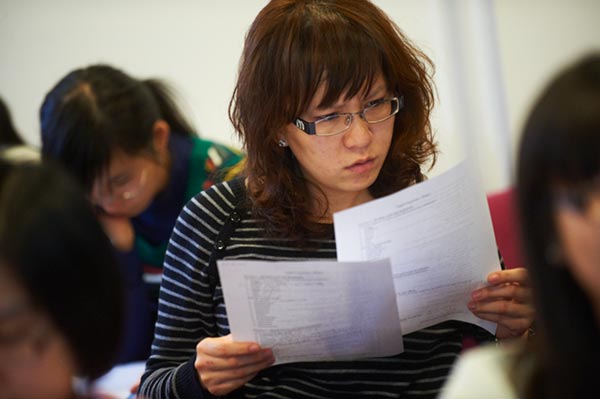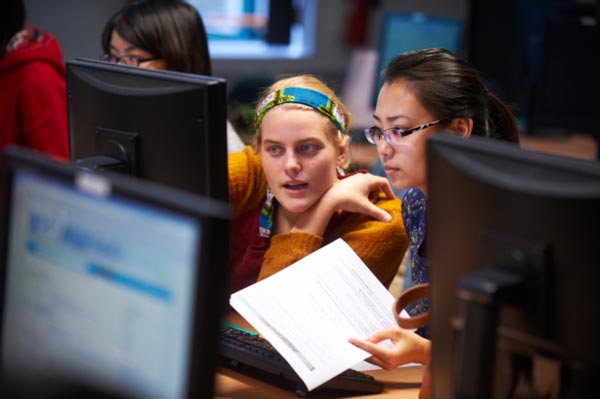
MA Comparative Education and International Development
Learn how educational challenges vary across the globe and how to counter them
Year of entry: 2026 (September)
Globally, education systems are witnessing unprecedented mobility, competition and disparities.
For students interested in a career addressing global educational challenges as a teacher, policymaker or researcher this course provides engagement with crucial contemporary issues:
- What are the key educational goals and problems the world is facing?
- How do cultural, economic and political differences between countries shape these problems and solutions?
- Can different countries learn from each other’s policies and pedagogies?
- Do international development goals recognise different educational realities?
Through a discussion of such questions, this course will help you develop an understanding of comparative education and how development goals relate to education.
CEID is more than just a course for me. I got to know more about the important role played by education and development programmes in countries globally. I learnt to think more critically and see these issues from multiple perspectives. More than anything, my highlight is the support I got from my coursemates, teachers and the university!
Course content
You will explore key debates in education and international development in the global context. You will develop a critical understanding of how development goals relate to education and how international agencies like the OECD and the World Bank shape education policies and programmes. You will examine how various national governments have responded to global educational agendas and challenges. You will develop an awareness of how nation-building projects, social stratification and austerity have shaped education policy and practice in the global north and south.
You will learn how to compare education systems and policies across nations and some key historical milestones in national and global education programmes. You will explore emerging debates within comparative education and methods of comparing educational systems, processes and outcomes in diverse contexts. You will learn how macro factors like culture, politics and economics play out at the micro level in education, that is, in teaching-learning, textbooks and assessment.
You will take a total of 180 credits, including core modules, option modules, and a dissertation.
Modules
Core modules
- Social Justice & Education
- Comparative Approaches to Education
- Education and Development in the ‘Global North’ and ‘South’
- Research Methods for Education I: Researching Questions
- Research Methods for Education II: Researching Answers or Professional Practice in Education*
*You must choose this module in Semester 2 if you want to take the Professional Practice Dissertation.
Option modules
You will also study one option module. In previous years, options have covered topics such as:
- Contemporary Issues in Teaching
- Evaluating UK Classroom Practice
- Gender, Sexuality and Education
- Higher Education in the 21st Century
- Intercultural Communication in Education
- Language and Power
- Migration and Education
- Motivation in Education
- Teaching and Learning with Technology
- Teaching World Englishes
The options available to you will be confirmed after you begin your course.
Elective modules
You may be able to replace one option module with an elective module, studying a complementary subject, a language or an interdisciplinary topic.
Our modules may change to reflect the latest academic thinking and expertise of our staff, and in line with Department/School academic planning.
Dissertation
- Independent Study Module (Dissertation)
- Professional Practice Dissertation (you need to choose the Professional Practice in Education module in Semester 2 to take this option)
You'll develop, design, implement and manage your own original research project, supervised by a member of staff with the relevant experience for your topic. To complete this masters, you will produce a 10,000-word dissertation based on your research project.
Previous studies have included an examination of global education in schools and elsewhere, universities as sites of global citizenship, and the role of the media.
Learning outcomes
Every course at York is built on a distinctive set of learning outcomes. These will give you a clear understanding of what you will be able to accomplish at the end of the course and help you explain what you can offer employers. Our academics identify the knowledge, skills, and experiences you'll need upon graduation and then design the course to get you there.
Learning outcomes for this course
- Identify key advantages and critiques of comparative approaches in education.
- Demonstrate understanding of theoretical and methodological debates in comparative education.
- Critically evaluate some of the key policy and political issues in education across global 'north' and 'south' contexts, as well as evaluating the labels, 'north' and 'south' in terms of degrees of 'development'.
- Interrogate your own understanding of the idea of development and the meaning of development in the context of sustainable development goals, especially, demonstrating an understanding of the importance of context in evaluating education and development programmes.
- Apply your knowledge of comparative education and development to specific case studies in a range of national and institutional contexts.
- Identify key challenges in dominant development discourses and agendas using feminist, critical and/or postcolonial lenses.
- Reflect independently and collectively (e.g., through group work as part of their seminars and assignments) on possible ways to address some of the challenges in education identified in the programme.
- Conceptualise and undertake independent research projects by engaging in thorough planning, rigorous ethics procedures and selection and application of appropriate methods.
Fees and funding
Annual tuition fees for 2026/27
| Study mode | UK (home) | International and EU |
|---|---|---|
| Full-time (1 year) | £12,000 | £26,900 |
Fees information
UK (home) or international fees? The level of fee that you will be asked to pay depends on whether you're classed as a UK (home) or international student. Check your fee status.
Find out more information about tuition fees and how to pay them.
Additional costs
There are no mandatory additional fees, but we do recommend that you set aside some money for photocopying. Course books will be available from the Library and online reading packs are available for most modules, but you may wish to buy your own copies. Each book typically costs £20 to 40.
Funding information
Discover your funding options to help with tuition fees and living costs.
We'll confirm more funding opportunities for students joining us in 2026/27 throughout the year.
If you've successfully completed an undergraduate degree at York you could be eligible for a 10% Masters fee discount.
Funding opportunities
Chevening Scholarships
We are pleased to work with Chevening Scholars to offer funding for our Masters programmes. Chevening Scholarships provide one year of fully-funded postgraduate study in the UK for international (including EU) students. The scholarships are open to early and mid-career professionals who have the potential to become future leaders.
Departmental scholarships
We offer some departmental scholarships. View details of funding and scholarship opportunities.
Chevening scholarships
Awarded by British embassies and high commissions, Chevening Scholarships provide one year of fully-funded postgraduate study in the UK. They are offered to early and mid-career professionals with the potential to become future leaders. We have hosted 34 Chevening Scholars in the past five years and welcome further enquiries and applications.
Teaching and assessment
You’ll work with world‐leading academics who’ll challenge you to think independently and excel in all that you do. Our approach to teaching will provide you with the knowledge, opportunities, and support you need to grow and succeed in a global workplace.
Teaching format
You will be taught through a combination of formal lectures, seminars, tutorials, practical exercises and workshops.
You'll spend time working on your own, reading assigned texts and researching supporting materials, as well as working with others in seminars to discuss and present your work.
There will also be opportunities to attend seminars from visiting scholars on a wide variety of educational topics.
You'll be supported academically and pastorally by a tutor who you will have one-to-one meetings with.
Teaching location
You will be based in the Department of Education on Campus West. Teaching for this course takes place at various locations on Campus West, including Vanbrugh, Derwent and Alcuin Colleges; and the Spring Lane teaching building.
About our campus
Our beautiful green campus offers a student-friendly setting in which to live and study, within easy reach of the action in the city centre. It's easy to get around campus - everything is within walking or pedalling distance, or you can always use the fast and frequent bus service.
Assessment and feedback
You'll be assessed in a variety of ways. The actual methods will depend on your choice of modules. Some common methods of assessment include:
- Assessed essays of up to 3500 words
- Lessons plans and commentary
- Series of blog posts
- Presentations (group and individual)
- Online exams
- Policy briefs
- Research proposal
- Portfolio work (reflective, critical analysis)
- Dissertation on an original piece of your own research.
Most modules will involve short assessed tasks through the course of the semester. These do not form part of your final mark, although you will be given feedback on your performance so you can prepare for the formal assessment.
Careers and skills
With its focus on policy and practice and a comparative lens this programme enables you to work in national and global education settings. The programme equips you to work in public and private sectors, for example, teaching in schools or higher education, working with local and national policy making bodies as well as international development agencies like the OECD or the World Bank.
You could also do a PhD and build a career researching education and development. Knowledge and skills gained through a range of core and optional modules allow you to select a route aligned with your individual interests and professional goal.
Career opportunities
- Education roles in schools, national and global NGOs and think-tanks, teacher-education institutions, education businesses.
- Development roles in public sector (as policymaker), private sector (impact and inclusion manager, HR advisor) and national and global development agencies.
- Research roles in public sector, charities, UN, academia.
- Journalist covering education and/or development issues.
Transferable skills
- Qualitative and quantitative research methods
- Data analysis
- Design and completion of original research
- Critical reasoning
- Communication skills (including intercultural communication)
- Academic and professional language skills in English
Entry requirements
| Qualification | Typical offer |
|---|---|
| Undergraduate degree | 2:2 undergraduate degree or an overseas qualification of an equivalent standard in a relevant discipline such as: Education, Sociology, Humanities, Social Sciences. Some educational experience in either teaching or administration is also considered beneficial |
| Other international qualifications | Equivalent qualifications from your country |
English language
If English isn't your first language you may need to provide evidence of your English language ability. We accept the following qualifications:
| Qualification | Minimum requirement |
|---|---|
| IELTS (Academic and Indicator) | 6.5, minimum 6.0 in each component |
| Cambridge CEFR | B2 First: 176, with 169 in each component |
| Oxford ELLT | 7, minimum of 6 in each component |
| Oxford Test of English Advanced | 136, minimum 126 in each component |
| Duolingo | 120, minimum 105 in all other components |
| LanguageCert SELT | B2 with 33/50 in each component |
| LanguageCert Academic | 70 with a minimum of 65 in each component |
| Kaplan Test of English Language | 478-509, with 444-477 in all other components |
| Skills for English | B2: Merit overall, with Pass with Merit in each component |
| PTE Academic | 61, minimum 55 in each component |
| TOEFL | 87, minimum 21 in each component |
| Trinity ISE III | Merit in all requirements |
For more information see our postgraduate English language requirements.
If you haven't met our English language requirements
You may be eligible for one of our pre-sessional English language courses. These courses will provide you with the level of English needed to meet the conditions of your offer.
The length of course you need to take depends on your current English language test scores and how much you need to improve to reach our English language requirements.
After you've accepted your offer to study at York, we'll confirm which pre-sessional course you should apply to via You@York.
Next steps
Contact us
Get in touch if you have any questions
Dr Anna Bull
Department
Related courses
Discover York







